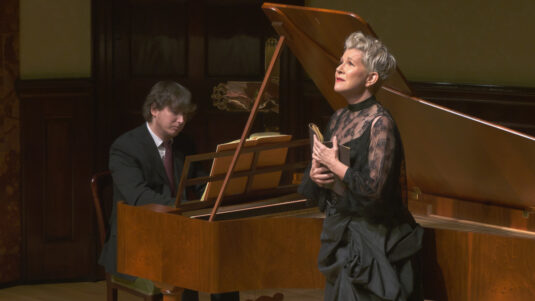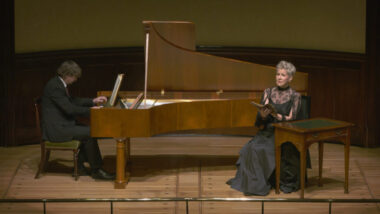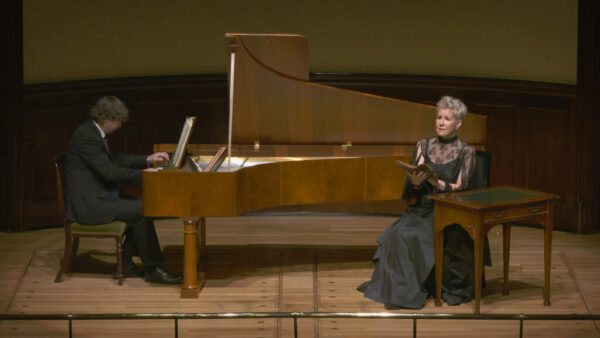 United Kingdom Schubert: Joyce DiDonato (mezzo-soprano), Maxim Emelyanychev (fortepiano), Wigmore Hall, London, 28.3.2025. (CSa)
United Kingdom Schubert: Joyce DiDonato (mezzo-soprano), Maxim Emelyanychev (fortepiano), Wigmore Hall, London, 28.3.2025. (CSa)

Schubert – Winterreise, D911
‘When I wished to sing of love it turned into sorrow, and when I wished to sing of sorrow, it was transformed for me into love.’ wrote the dying Schubert.
There is no more musically eloquent demonstration of the 31-year-old composer’s epic struggle with sorrow, love, and loss than his bleak late song cycle Winterreise. It is a setting of 24 poems by Wilhelm Müller and chronicles the psychological journey of a lonely and tormented traveller, rejected in love, as he journeys through a desolate physical and emotional winter landscape towards death.
The work was conceived for a man’s voice and there have been any number of male-voiced ‘travellers’ since the first public performance of this work, believed to have taken place shortly after Schubert’s death in November 1828. There is also a long and well-established tradition of women singers too. From Therese Behr-Schnabel in 1909, accompanied on the piano by her husband Artur Schnabel, the distinguished role call includes legendary sopranos and contraltos such as Elizabeth Schumann, Kirsten Flagstad, Christa Ludwig, Brigitte Fassbaender and Natalie Stutzmann. To this list, one must add the name of the great American coloratura mezzo-soprano Joyce DiDonato who, together with Canadian-born conductor Yannick Nézet-Séguin at the keyboard, recorded Winterreise in a live performance at Carnegie Hall in 2019. She last performed it more widely in European concert halls in 2021. Reprising it to a Wigmore Hall audience, she was joined by the supremely gifted Maxim Emelyanychev on fortepiano.
Apart from a brief reference in the first of the poems – Gute Nacht to ‘the girl who spoke of love and her mother of marriage’ and to the fact that the young woman has fallen for another and become ‘a rich bride’, neither Müller nor Schubert provide any more detail about her. We know nothing of her reaction to her jilted lover’s departure, and once he leaves, nothing to suggest any further communication between them. In a radical reinterpretation, DiDonato approaches the work from the perspective of the unknown and unnamed woman. ‘What happens to our beloved Winterreise when we view it through a different lens and follow the parallel journey of the one left behind? Where does this masterful cycle take us when viewed from her point of view?’ asks DiDonato in the programme note. ‘Does she mourn him? Resent him? Does she still love him? What has her journey been since finding “Gute nacht” etched on her gate in the morning light?’ So how do performers set about telling Müller’s untold story, and should they try? DiDonato attempted to provide the answers by adopting a simple and operatic device whereby the unidentified girl receives a journal from her former lover through the post. She learns of the anguishing details of his journey by reading the text, and we witness her reaction – vividly conveyed, visually and vocally.

Swathed in a dramatic black gown suggestive of widow’s weeds, DiDonato sang either seated at a small antique desk to the left of the platform or stood next to the pianoforte to read from ‘the journal’, a prop used to conceal the vocal score on which she relied throughout the performance. Her gorgeously rich, velvety voice – free-floating and pure in her upper register, magisterial and sonorous in her lower range – inexorably drove the bleak narrative every step of the way, subtly enhancing the shifting colours of Schubert’s melodies. The fine acoustic of the Wigmore Hall’s 552-seat small auditorium gave the performance the immediacy and impact of a drawing-room Schubertiade. The recital was further enhanced by the late substitution of a McNulty pianoforte in place of the Hall’s Steinway mighty grand. This smaller instrument produced a reduced yet authentic sound which exposed every detail of Maxim Emelyanychev’s sensitive and perfectly balanced playing.
The vocal and technical demands of the musical terrain of Winterreise are as great as the emotional ones, and in the earlier songs such as Erstarrung (Numbness) and Rückblick (A backward glance) one felt as if DiDonato was straining at the outer extremities of her range. As the journey relentlessly progressed, the voice eased, and its tone grew more expansive and intense. Her account of Auf dem Flusse (On the stream) in which the frozen river becomes a metaphor for the traveller’s beating heart, was sung with great delicacy, while Irrlicht (Will o’the wisp) and Das Wirthaus (The Inn) were notable for their piercing beauty.
There is reference in the programme note to ‘an unpleasant history of squabbling critics’ complaining about whether women should step into the Narrator’s shoes and embark on Schubert’s perilous journey at all. Thankfully, those die-hard purists who oppose the idea occupy a diminishing musical manosphere and choose to ignore the fact that female singers can bring great beauty and a unique interpretive dimension to the cycle. Certainly, the supreme artistry displayed by DiDonato was never in doubt, although her decision to act out the narrative from the woman’s viewpoint presented a set of problems which ultimately undermined the performance.
First and foremost, the text and Schubert’s musical response to it is profoundly immersed in the Narrator’s complex feelings and not those of the woman. The spectrum of intense emotions displayed, in these songs reveal his inner conflicts and desires and not her reaction to them. Neither Müller nor Schubert chose to explore the woman’s role, and the assumption that she knew of – or even cared about – her former lover’s sufferings is entirely speculative. Secondly, there is no textual basis to support the notion that this weary, half-frozen traveller, on the edge of mental collapse, found the time and energy to write to his beloved. All we know about possible correspondence is contained in one song – Die Post (The Post) – in which the sound of a post horn momentarily raises his hopes that she might have written to him. Last, but not least, while the cycle has been dramatized in the past and even danced to great effect, Winterreise focuses on an introspective and internalised world in which the words and music do the heavy walking. Unlike an opera, it is a work of great intimacy. Too many hand gestures, exaggerated facial expressions and physical movement can, and sadly on this occasion, did distract.
Nonetheless, tumultuous applause justly rewarded DiDonato’s emotionally devastating rendition of the last song, Der Leiermann (The Hurdy-Gurdy Man) in which the traveller unflinchingly confronts the inevitability of his own death. DiDonato reciprocated with a reward of her own: a glorious account of Richard Strauss’s ‘Morgen!’ which served to remind the audience that love and hope triumph even in the darkest of times.
Chris Sallon
